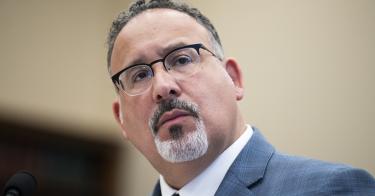The U.S. Department of Education is on a losing streak. College student loan “forgiveness?” Stuck in legal limbo. Update to the federal student loan online platform? System crashed. Radical changes to Title IX of the Civil Rights Act? Courts have issued injunctions.
Conservatives have argued for years that the federal education agency is unconstitutional, but the department is making its own case for closure by promulgating policies that are either ineffective or illegal (or both). And a new U.S. Supreme Court ruling has accelerated its drive to futility.
Start with student loans. President Joe Biden's administration has twice tried to shift the cost of repaying student loans from borrowers to taxpayers. Under the guise of “loan forgiveness,” the Biden team wants Americans who are working and raising families to pay college loans for people they have never even met. The U.S. Supreme Court blocked one plan in 2023, and, more recently, a federal district judge said Education Secretary Miguel Cardona exceeded his authority in another attempt. Despite these rulings, the White House was still able to put taxpayers on the hook for some loans, but the overall initiative has been pummeled in court. Strike one.
>>> Parents Need Charter Schools That Offer Non-Woke Options
The agency also tried to update the Free Application for Federal Student Aid (FAFSA) online platform, which helps college applicants acquire loans. The new system was riddled with bugs, and the platform became nearly unusable for students. Writing in The Atlantic, Adam Harris said, “This fiasco has left students unsure if they'll have the money to pay for college, necessitated that institutions change long-set deadlines, and, to some extent, justified Republican lawmakers' charges of government ineptitude.” Strike two.
Then there is the issue of redefining sex in federal law. The agency spent three years trying to change the Education Amendments of 1972 to the Civil Rights Act, replacing “sex” in the law with “sexual orientation and gender identity.” Yet courts in states such as Kansas and Louisiana blocked this radical idea. Under this redefinition of sex, K-12 school officials will be forced to allow boys to use girls' bathrooms and have boys participating on girls' athletic teams.
The new definition of sex endangers females in private spaces and robs them of hard-earned athletic achievements. Courts are having none of it. Strike three.
The department has also whiffed on key metrics for more than 40 years. The achievement gap between students at the highest and lowest ends of the economic scale has stayed the same for half a century. Today, reading and math scores, on average, are near historical lows. Meanwhile taxpayers spent some $200 billion at the federal level on schools during the COVID-19 pandemic, on top of the more than $60 billion they spend annually just in federal school allocations (including state and local revenues, taxpayers spend some $800 billion yearly on education).
Think of it this way: The average monthly rent payment is about $1,400. To arrive at the $800 billion spent on K-12 public schools annually, you would have to make that average rent payment for more than 571 million months, or 47.6 million years. Let's hope you can sublet.
>>> America’s Teachers Are Unhappy. Here’s How We Can Turn That Around
The department is playing fast and loose with taxpayer money and federal law. But that is about to change. Last week, the Supreme Court held in Loper Bright v. Raimondo that administrative agencies (like the Department of Education) no longer deserve deference from the courts when there is ambiguity in federal law. Known as Chevron deference, this practice gave outsized influence to unelected bureaucrats in federal departments to interpret the law. For instance, consider that the Biden administration's attempt to rewrite Title IX comes in a 423-page regulation based on just 37 words in the original statue. That's exactly the kind of overreach the Supreme Court just rejected.
The administration's future plans to shift the burden of student loan repayments to taxpayers face an uphill battle in the wake of Loper. Based on a few vague words in the Higher Education Act, the Department of Education's Savings on Valuable Education plan rewards upper-income earners and penalizes responsible borrowers who repaid their own loans. Fortunately for taxpayers, the Loper decision will make it harder for the agency to force taxpayers to pay for college loans.
Overturning Chevron should help wind down a department that Jimmy Carter created after making promises to teacher unions. The Education Department has clearly failed to live up to its promises to American children. It would be a victory for families and students to end the agency's losing streak by closing it down.
This piece originally appeared in Newsweek




